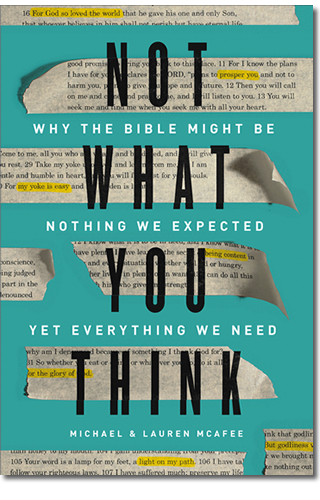Stereotypes about millennials abound. Whether we’re seen as entitled and lazy, or educated and revolutionary, millennials are parodied in various ways. One thing my generation isn’t stereotypically known for, however, is an ardent use of the Bible. Why would we be? Riding in on the coattails of modernity and secularism, we know that there’s little to no social mobility that comes with Christianity.
Whatever the deficiencies millennials might have to reckon with, we also face unique challenges that our parents and grandparents didn’t. We’re having to figure out how to belong and where to ground our morals anew—all while managing multiple side-gigs so that, hopefully, we can retire before we’re 100.
This creates a sense of urgency that plays on the romantic impulse of our age. All of our experiences—from our relationships to the cups of coffee we order—must serve as authentic expressions of ourselves. This impulse shapes the causes we support and the content we consume.
Why, then, do we need an ancient library of books to help us shape our lives? In Not What You Think: Why the Bible Might Be Nothing We Expected Yet Everything We Need, Michael and Lauren McAfee argue for not only why millennials should care about the Bible, but also why the Bible is a needed resource in our cultural moment. “This book is an appeal to young adults from young adults, for us to reconsider our place in the world and the Bible’s place in ours” (16).

Not What You Think: Why the Bible Might Be Nothing We Expected Yet Everything We Need
Michael McAfee & Lauren Green McAfee
Not What You Think: Why the Bible Might Be Nothing We Expected Yet Everything We Need
Michael McAfee & Lauren Green McAfee
The Bible is seen by many contemporary readers as intolerant, outdated, out of step with societal norms at best, and a tool of oppression at worst. In this earnest and illuminating read, millennial thought leaders and aspiring theologians Michael and Lauren McAfee are here to say: fair enough. But they’re also here to raise a few questions of their own: What if we cleared the deck on our preconceptions of this book and encountered it anew? What if we came with the understanding that our questions are welcome? And what if these pages presented less of a system to figure out, and more of a story to step into—a story with more surprising plot twists than we might think?
For Our Cultural Moment
The McAfees are keenly aware that “[millennials] have dismissed the Bible before ever reading it and allowing the Book to stand or fall on its merits” (24). To answer this disparity, the McAfees—PhD students at The Southern Baptist Theological Seminary and employees at the Museum of the Bible—encourage and challenge those of us who regularly interact with the Bible, have little to no interest in the Bible, and those who no longer consider the Bible as transcendent or divine (28–29).
Millennials themselves, the McAfees’s work is a careful and sympathetic one. You won’t see pejoratives like “snowflakes” as they discuss millennials’ emotive aversion to the Bible. After they take time to explain who millennials are in part one of the book, they lay a foundation for how younger generations should approach the Bible.
While the work suffers from a bit too many pop-culture references, Not What You Think successfully helps equip younger generations with the categories necessary to read the Bible. Moreover, the McAfees develop ideas like a Christocentric reading of Scripture without overwhelming readers with theology-speak:
But when you understand the context of the writings, you begin to see [this broken story of humanity] form a stunning mosaic. A picture begins to develop of a Savior for a humanity in desperate need of salvation. For the barren, he will be like a son; for the faithful, he will be like a priest; for the lost, he will be like a shepherd; for the nations, he will be like a king (79).
Books like this can quickly fall into the categories of philosophical discourse or just another a tool in the culture war. Not What You Think does neither. Instead, the McAfees point out the unparalleled resources in God’s Word that help us live not only ethically but also beautifully (cf. 105–17).
Searching for Spirituality
A strong point of Not What You Think is its comparison of spiritual views. While young adults are known for wanting the formation and wisdom that comes with spiritual practices, they often want it free of tradition: “This is one of the great appeals of practicing yoga, Buddhism, and the like. The promise of impersonal unencumbered spiritual experience is intoxicating” (162).
These intuitional spiritual views are attractive because “whether you discover meaning [on your spiritual journey] matters less than the fact that you went exploring in the first place” (162). The McAfees then contrast this with biblical spirituality:
The Bible paints a picture of a spiritual life that is mediated. You are not left to your own devices. You are not on this journey alone. God intervenes in your journey and offers a relationship to you. You grow spiritually and experience spirituality through that relationship with God. The relationship is both the journey and the destination. (163)
As truly God and truly man, Jesus demonstrates what “a fully functional spirituality looks like” (163). However, he doesn’t merely demonstrate spirituality—he isn’t some guru hoping you’ll buy a ticket to his next conference. He doesn’t pitch us another philosophy or paradigm for enlightened living; he is the eternal Word wrapped in flesh, coming to us as Mediator, Savior, and Friend. He doesn’t tell us about a way to live; he is the way, the truth, and the life.
Other spiritual views put the onus on you to be in tune with the universe. But the gospel is the good news of Christ’s work on our behalf—his spirituality, not ours.
Helpful Resource
Not What You Think is not a comprehensive defense of the trustworthiness of Scripture. But for our curious and skeptical friends and family members, the McAfees have delivered a helpful resource on how to begin that conversation with them.
The Bible might be nothing they expect, but it’s everything they need.






































